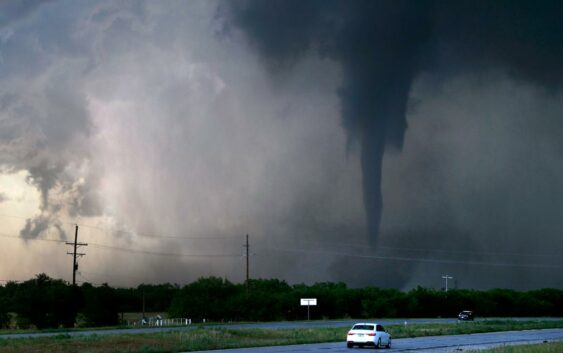- Seven months after Hurricane Helene, Chimney Rock rebuilds with resilience
- Wildfire in New Jersey Pine Barrens expected to grow before it’s contained, officials say
- Storm damage forces recovery efforts in Lancaster, Chester counties
- Evacuation orders lifted as fast-moving New Jersey wildfire burns
- Heartbreak for NC resident as wildfire reduces lifetime home to ashes
Second tornado in 5 weeks damages Oklahoma town and causes 1 death as powerful storms hit central US

At least four tornadoes had been spotted in north central Oklahoma, including one about a 45-minute drive north of Tulsa.
OKLAHOMA CITY — A tornado destroyed homes, forced the evacuation of a nursing home and toppled trees and power lines when it roared through a small Oklahoma town, one of several twisters that erupted in the central United States amid a series of powerful storms that stretched into Tuesday. At least one death was reported.
The tornado ripped through the 1,000-person town of Barnsdall, about a 40-minute drive north of Tulsa, on Monday night. It was the second tornado to hit the town in five weeks — a twister on April 1 with maximum wind speeds of 90 to 100 mph (145 to 161 kph) damaged homes and blew down trees and power poles in Barnsdall.
The National Weather Service’s Storm Prediction Center cited 17 reports of tornadoes from Monday evening through early Tuesday in the central part of the United States. Eight of the twisters were in Oklahoma, two each in Kansas, South Dakota and Iowa, and one each in Nebraska, Missouri and Tennessee.
At least 30 to 40 homes in the Barnsdall area were damaged Monday night, the Oklahoma Highway Patrol reported, and a nursing home said it evacuated residents because a gas leak could not be turned off due to storm damage. Numerous road closings due to debris also were reported, according to Osage County Emergency Management.
One person died in Barnsdall and at least one is missing, Osage County Undersheriff Gary Upton said by telephone.
“It is a small town and it just pretty much went right through the center of it,” he said.
The Barnsdall Nursing Home posted online that all residents were accounted for with no injuries. They were being taken to other facilities. It asked families to bear with them “as it is chaos in town … Please pray for us.”
Damage also was reported in Bartlesville, about 20 miles (32 kilometers) northeast.
“We did take a direct hit from a tornado” in the city, said Kary Fox of the Washington County Emergency Management. “Please stay off the roadways. Stay out of those damaged areas. We’re having a lot of difficulty getting in to do assessments to check on people, to see if they’ve got any injuries because of the traffic congestion.”
A survey team planned to head out Tuesday to evaluate damage in Barnsdall and Bartlesville, and in Arkansas, according to Joe Sellers, a meteorologist with the weather service’s office in Tulsa, Oklahoma.
The storm prediction center warned of an enhanced risk of severe thunderstorms across the Ohio Valley on Tuesday with a possibility of few, potentially strong, tornadoes, hail and severe, damaging winds.
The main threat was shifting east Tuesday, said Roger Edwards, lead forecaster with the center, though it is not as intense a threat as on Monday.
The weather service in Tulsa had warned Monday evening that “a large and life-threatening tornado” was headed toward Barnsdall, with wind gusts up to 70 mph (112 kph). Meteorologist Brad McGavock said information on the tornado’s size and how far it traveled wasn’t immediately available Monday night.
The storms began earlier Monday with gusty winds and rain. But after dark, tornadoes were spotted skirting northern Oklahoma. At one point in the evening, a storm in the small town of Covington had “produced tornadoes off and on for over an hour,” the National Weather Service said. Throughout the area, wind farm turbines spun rapidly in the wind and blinding rain.
In Kansas, some areas were pelted by apple-sized hail 3 inches (7.6 centimeters) in diameter.
The storms tore through Oklahoma as areas, including Sulphur and Holdenville, were still recovering from a tornado that killed four and left thousands without power late last month. Both the Plains and Midwest have been hammered by tornadoes this spring.
Oklahoma’s State Emergency Operations Center, which coordinates storm response from a bunker near the state Capitol, remains activated from last weekend’s deadly storms.
Monte Tucker, a farmer and rancher in the western Oklahoma town of Sweetwater, had spent Monday putting some of his tractors and heavy equipment in barns to protect them from hail. He said he let his neighbors know they could come to his house if the weather becomes dangerous.
“We built a house 10 years ago, and my stubborn wife put her foot down and made sure we built a safe room,” Tucker said. He said the entire ground-level room is built with reinforced concrete walls.
Oklahoma and Kansas had been under a high-risk weather warning Monday. The last time such a warning was issued was March 31, 2023, when a massive storm system tore through parts of the South and Midwest including Arkansas, Illinois and rural Indiana.
The entire week is looking stormy across the U.S. The eastern U.S. and the South are expected to get the brunt of the bad weather through the rest of the week, including in Indianapolis, Memphis, Nashville, St. Louis and Cincinnati, cities where more than 21 million people live. It should be clear over the weekend.
Meanwhile, floodwaters in the Houston area began receding Monday after days of heavy rain in southeastern Texas left neighborhoods flooded and led to hundreds of high-water rescues.
St. John reported from Detroit and Salter from O’Fallon, Missouri. Associated Press writers Rio Yamat in Las Vegas; Heather Hollingsworth in Mission, Kansas; Colleen Slevin in Denver; Kathy McCormack in Concord, New Hampshire; and Sarah Brumfield in Silver Spring, Maryland; contributed to this report.